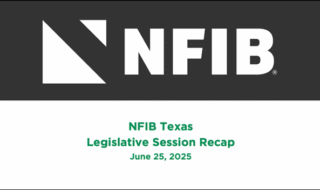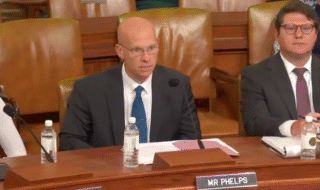March 26, 2025
NFIB helped stop four highly harmful bills from passing
The 2025 Legislative Session officially concluded at noon on Saturday, March 22, wrapping up a 60-day period marked by a high volume of legislation and critical debates on issues that directly impact New Mexico’s small businesses.
By the Numbers:
— 1,182 bills were introduced
— 148 memorials, joint memorials, resolutions, and concurrent resolutions were introduced
— 195 bills passed both chambers and have been sent to the Governor for action
— 52 memorials and resolutions were adopted by the Legislature.
Throughout the session, NFIB tracked 40 pieces of legislation with the potential to impact small businesses across the state. Four proposals that would have made running a small business in New Mexico more difficult than it already is were defeated in part due to the intense lobbying efforts of NFIB New Mexico.
One of the most concerning proposals was House Bill 11, the Paid Family & Medical Leave Act. This sweeping bill would have created a mandatory, state-run leave program funded by payroll taxes on both employers and employees. Even small businesses with as few as one employee would have been required to participate, regardless of whether they already provided paid leave. The bill proposed to create significant administrative burdens and legal risks, while limiting flexibility for employers and layering on additional costs. NFIB stood firmly in opposition and helped ensure the bill did not advance. The bill was defeated in the Senate Finance Committee on a bi-partisan 8-3 vote against the bill.
We also opposed House Bill 246, which would have increased New Mexico’s minimum wage to $17 per hour starting in 2026, eliminated the tipped wage system, and tied future increases to inflation. The bill went further by repealing key exemptions, including for nonprofit employees, apprentices, and some agricultural workers—dramatically expanding compliance requirements across sectors. For small employers already struggling with labor shortages and tight margins, this dramatic wage hike would have made it even harder to stay open, much less grow. NFIB pushed back hard, elevating the voice of small business owners who warned of lost jobs, reduced hours, and closed storefronts if HB 246 became law. The bill passed the House Labor Committee but never received a hearing in the Houe Appropriations Committee.
House Joint Resolution 3, the so-called Green Amendment, proposed amending the New Mexico Constitution to grant sweeping, self-executing environmental rights. While well-intentioned, this measure posed major legal and economic risks. It would have created new grounds for lawsuits against the state and local governments—and potentially against businesses—by allowing individuals to challenge any policy, permit, or development they believed harmed the environment. With no legislative definition or regulatory framework, it opened the door to legal uncertainty and regulatory paralysis, deterring investment and complicating infrastructure and land-use decisions statewide. NFIB joined a wide range of organizations in opposing this deeply flawed proposal. The bill passed the House Government, Elections & Indian Affairs Committee “without recommendation,” and was never brought up for a hearing in the House Energy, Environment & Natural Resources Committee.
Lastly, House Bill 84, the Employee Free Speech Act, would have placed sweeping restrictions on employer communication in the workplace. Modeled after so-called “captive audience” laws passed in other states, the bill would have prohibited employers from requiring employees to attend meetings where “politics” are discussed—but it defined “politics” so broadly that it included not only elections, but also legislation, regulations, public policy, and even civic, fraternal, or labor organizations. While framed as a worker protection, in reality it would have infringed on employers’ free speech rights and severely limited their ability to communicate with their teams about policies, regulations, and business concerns. Similar laws in other states have already triggered major constitutional challenges, including one led by NFIB in Minnesota. We strongly opposed HB 84 and helped ensure it did not gain traction in New Mexico.
Advancing Pro-Small-Business Reforms
NFIB didn’t just play defense this year, we also helped shape the agenda, draft and champion key legislation to promote transparency, reduce unnecessary costs, and ensure small business voices are heard in policymaking. Although none of our proactive bills made it across the finish line this year, they helped drive the policy conversation and build momentum for future sessions.
Heath Care
Among our signature efforts was House Bill 279, sponsored by Representatives Nicole Chavez, Gail Armstrong, and Elaine Sena Cortez. This bill proposed to establish an optional process for lawmakers to request independent actuarial reviews of proposed health insurance mandates. The goal was to ensure that future health care legislation is informed by real cost data, not guesswork, by analyzing fiscal and coverage impacts before new mandates are enacted. With health insurance affordability remaining the number one concern for small employers, HB 279 sought to give lawmakers the tools to make smarter decisions that protect small business health insurance premiums. The bill was heard in the House Health & Human Services Committee but stalled with the Democrats voting against the bill and Republicans supporting the bill.
Attorneys’ Fees
NFIB also drafted and championed House Bill 262, introduced by Representative Rebecca Dow. This straightforward measure increases transparency in legal advertising by requiring attorneys who advertise settlement or judgment amounts to also disclose the attorney fees associated with those cases. Under this bill, if an attorney or law firm advertises a settlement or judgment amount, they must also disclose how much of that total went to attorney fees. The goal is simple: give consumers a clear, honest picture of what legal outcomes actually look like—while also helping to reset expectations in a legal environment where splashy numbers too often overshadow reality. The bill never received a hearing in the House Consumer & Public Affairs Committee.
Litigation Transparency
To address the growing threat of hidden third-party funders manipulating lawsuits for profit, NFIB crafted and advocated for House Bill 312, the Litigation Financing Transparency Act, sponsored by Representative Marian Matthews and Representative Alan Martinez. This legislation proposed to address the expanding but opaque industry of litigation funding, where hedge funds and even foreign actors finance lawsuits for profit. HB 312 did not propose to ban this practice but sought to ensure full disclosure of funding arrangements and prohibit financiers from influencing legal decisions—critical steps to protect New Mexico’s small businesses from abusive or prolonged litigation. The bill passed the House Government, Elections & Indian Affairs Committee with bipartisan support, but did not receive a hearing in the House Judiciary Committee.
Rulemaking Process
Finally, NFIB spearheaded House Bill 425, a commonsense reform to the State Rules Act, sponsored by Representatives Gail Armstrong, Rebecca Dow, and Cristina Parajón. This legislation proposed to require state agencies to respond in writing to every public comment received during the rulemaking process—and to publish those responses in the New Mexico Register. For years, small business owners have participated in hearings and submitted feedback, only to see little acknowledgment or transparency. HB 425 ensures that those voices are no longer ignored and that agencies are held accountable for how they consider stakeholder input. The bill never received a hearing in the House Government, Elections & Indian Affairs Committee.
Together, these four bills represent a strong slate of reforms that reflect NFIB’s commitment to a fairer, more transparent environment for small businesses in New Mexico. Whether addressing the cost of health care, the clarity of legal advertising, the integrity of the courts, or the rulemaking process itself, these measures put small business interests front and center in the policymaking conversation.
Standing Strong for Small Business
As the dust settles on the 2025 session, NFIB New Mexico is proud of the role we played, including drafting smart reforms, defeating costly mandates, and amplifying the voice of Main Street businesses. This year’s wins demonstrate the power of organized small business advocacy. When small business owners speak up, lawmakers listen.
Thank you to every NFIB member who emailed a legislator, testified in committee, or met with an elected official. Your engagement fuels our advocacy and ensures that small businesses remain a force to be reckoned with at the Roundhouse.
— Jason Espinoza, New Mexico State Director
NFIB is a member-driven organization advocating on behalf of small and independent businesses nationwide.
Related Articles














